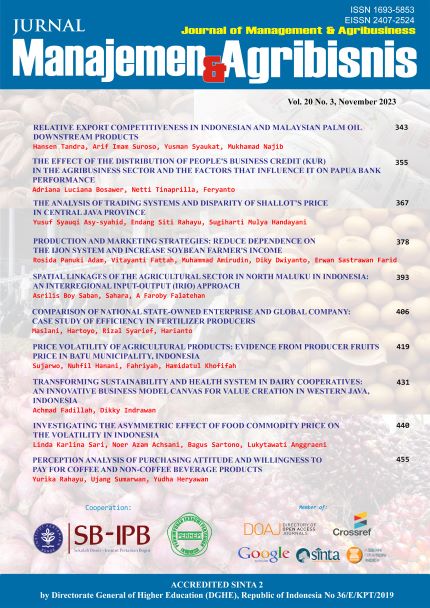Assessing The Impacts of Food and Mouth Disease Outbreak on The Indonesian Economy and Its Regional Growth
Abstract
Foot and mouth disease (FMD) is typically endemic and commonly found as a recurring issue in many developing countries, including Indonesia. In 2022, FMD has massively spread to 62 districts and cities so that it was declared an outbreak which caused significant economic losses. In this paper, we attempt to assess the impacts of FMD on the Indonesian economy by using a computable general equilibrium (CGE) approach. The results show that the FMD outbreak caused negative pressure on national economic growth, reducing the real wage and consumption, as well as exacerbating trade deficit. The outbreak also induced higher prices of beef and dairy sectors as well as their related sectors. Based on the regional perspective, the main production regions of beef and dairy are expected to suffer higher economic loss than that of other regions. Meanwhile, at the household level, the outbreak caused considerable effect in lowering income and consumption, particularly for rural farm households. Some necessary policies to overcome the outbreak, consisting of establishing a FMD handling post, promoting vaccination, extending financial supports, and maintaining communication and transparency with other countries regarding the outbreak status.
Keywords: Computable General Equilibrium (CGE), Foot and Mouth Disease (FMD), livestock, macroeconomy, regional
Authors
Authors who publish with this journal agree to the following terms:
- Authors retain copyright and grant the journal right of first publication with the work simultaneously licensed under a Creative Commons Attribution License that allows others to share the work with an acknowledgement of the work's authorship and initial publication in this journal.
- Authors are able to enter into separate, additional contractual arrangements for the non-exclusive distribution of the journal's published version of the work (e.g., post it to an institutional repository or publish it in a book), with an acknowledgement of its initial publication in this journal.
- Authors are permitted and encouraged to post their work online (e.g., in institutional repositories or on their website) prior to and during the submission process, as it can lead to productive exchanges, as well as earlier and greater citation of published work (See The Effect of Open Access).

